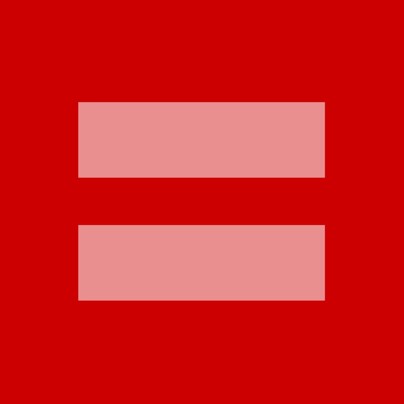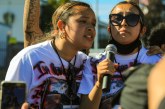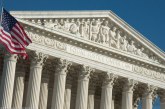
Supporters of Prop 8’s ban on same sex marriage want to have it both ways. On the one hand they will point to the expression of popular will in the Prop 8 vote, but at the same time they wish to ignore the sea change of public opinion, not just in California but nationwide, on this subject.
Last week, Nate Silver analyzed eight national polls on the same-sex marriage question and found, “The consensus of these polls is that support for same-sex marriage now exceeds opposition to it; on average, the polls have 51 percent saying they approve same-sex marriage, and 43 percent saying they are opposed.”
While the polls differ in their exact numbers, none of the eight now show even a plurality for opposition.
The trend, however, is stunning. When the DOMA (Defense of Marriage Act) was passed by Congress and signed by President Bill Clinton in 1996, nearly 70% of the population opposed same-sex marriage, while less than 30% supported it.
Even in 2004, it was still just about 60% opposition to 32% in support. And in 2008, it was 55% opposition to 40% support.
That is the picture nationally.
“Before last year, the increased support for same-sex marriage at the polls had largely failed to translate into success at the ballot booth,” Mr. Silver writes, noting that the 2006 Arizona ballot proposition to ban same-sex marriage and civil unions was rejected by the voters there, but voters did approve a more narrow ban on same-sex marriage two years later.
In California, a Field Poll conducted in February showed that, by a 61-32 margin, Californians now approve of allowing same-sex couples to marry.
The trend in California is nearly as remarkable as nationwide.
“In 1977 the Field Poll found 28% approving and 59% disapproving of same-sex marriages,” the pollsters write in their release. “In nine periodic surveys taken between that time and 2012, there was a steady increase in support for allowing same-sex couples to marry. The latest survey shows 61% of voters approving and 32% disapproving, a record high level of support.”
Democrats and non-partisans both strongly support same-sex marriage with 71% approving, but only 39% of Republicans and 25% of conservatives support it. Liberals support it at 90%, while moderates support it at 67%.
Los Angeles County supports it at a 64% rate, San Francisco Bay Area at a 77% percent rate, but the rest of the state is around 54% to 55%.
In just three years, support overall went from 51% to 61%. Whites went from 53% support to 65% support. Latinos from 50% to 56% support. But most significantly, African-Americans in 2010 were only 41% in support, but by 2013 they moved to 64% support.
However, Nate Silver argues there is likely still a discrepancy between people’s polled preferences and how they will vote. Indeed, in 2008 the Field Poll found 51% approval and only 42% opposition to same-sex marriage, but in an election that saw Democrat Barack Obama wallop Republican John McCain, same-sex marriage narrowly lost.
Nate Silver goes on to create a model to “project how the results in each state might change over time. I assume that support for same-sex marriage will continue to increase by one and a half percentage points nationally per year, which reflects the recent historical trend from both polling and ballot-initiative data.”
Projecting into the future, California goes from 48.6% support in 2008 to 54.6% support in 2012, then to 60.4% support in 2016 and 66.1% support in 2020.
He notes, “This model predicts the results of the 2012 ballot propositions quite accurately, accounting for some of the more subtle demographic distinctions that we had lost previously.” Mr. Silver adds, “It projects that voters in roughly 20 states would have voted in favor of same-sex marriage last year, including the four states that actually did so.”
At the same time, “The model also projects, however, that a national referendum to approve same-sex marriage would have narrowly failed last year, 48 percent to 52 percent, despite national polls showing more voters approving same-sex marriage than opposing it.”
However, by 2016, he projects that voters in 32 states would be willing to support same-sex marriage and by 2020, voters in 44 states would do so.
That is, of course, assuming that “same-sex marriage continues to gain support at roughly its previous rate.”
How will this affect the Supreme Court’s ruling? The analysis from last week made it fairly clear that there were two well-defined blocs in the court, with the liberal bloc in clear support and the conservative bloc in clear opposition to overturning the ban, throwing out DOMA, or finding a right to same-sex marriage.
Al Hunt in the New York Times on Sunday argues, “The substantive case against gay marriage collapsed in the U.S. Supreme Court last week.”
However, he argued, “Advocates of same-sex marriage won’t win the sweeping victory they once anticipated as they made arguments last week.”
Instead, Mr. Hunt predicts, “The court is likely to overturn a California law, which precludes same-sex marriage, on technical grounds. The 17-year-old U.S. Defense of Marriage Act, defining marriage as between a man and woman and thus denying U.S. government spousal benefits to gays and lesbians, almost certainly will be thrown out on the grounds that such decisions should be left to the states.”
The upshot, he argues, will be, “Gay marriage will be legal in 10 states, including California, and the District of Columbia. The battle will continue to be waged by referendum and in state legislatures in the other 40 states, with endless legal challenges.”
If you do Nate Silver’s math, same-sex marriage supporters should be able to live with that and the fact that time is on their side.
—David M. Greenwald reporting






Well written.
What people say about it in polls differs from what people do about it in the poll booth. The engine of media-driven political correctness combined with a large army of committed semi-employed gay-rights activists living off the soft money of government creates a hostile environment that prevents open dialog. So, people say one thing and vote another.
The tide is definitely turning, just not as fast as the polls and the dreamers want to have us believe.
“What people say about it in polls differs from what people do about it in the poll booth. “
That was the whole point of Nate Silver’s exercise to model the difference between polling and outcomes and then project.
Polls reflect, in large part, how the issue is presented. It is very possible, that if the issue is presented in a ballot measure with campaign arguments and positions in which the voter is asked to choose between supporting redefining marriage to include same-sex couples or maintaining the millenniums-old Western culture definition of marriage as a union between a man and a woman while guaranteeing full and equal substantive rights(substantive meaning measurable, tangible rights rather than subjective feelings and attitudes) to civil unions,the majority of voters would choose to maintain the traditional definition of marriage.
As I understand it, some of the biggest clashes are those of religious rights vs. sexual preference rights.
I seem to remember hearing about many lawsuits involving peoples religious beliefs–e.g. a christian wedding photographer being sued for refusing to work on a gay couples marriage pictures, or making a wedding cake for gay couple, etc. Or churches not being able to turn away gays for employment, etc. Guess it’s OK to bash christian or maybe even Mormon churches for such discrimination; what about Muslims? How do you think Muslim institutions will react to forced to being “inclusive?”; and will they get a pass and not Christian or Mormon churches?
[quote]How do you think Muslim institutions will react to forced to being “inclusive?”; and will they get a pass and not Christian or Mormon churches? [/quote]
Good point jimt and you can bet on it. Liberals always seem to back off when it comes to forcing Muslims into being all inclusive.
GI
[quote]Liberals always seem to back off when it comes to forcing Muslims into being all inclusive.[/quote]
Your evidence for this assertion please.
Also, it seems to me that it is primarily those who claim Christianity as their religion who are the most vocal about verbally defending religious freedom…..at least as long as there is no impingement on Christian religious freedom, but certainly often do not promote the same freedoms for those of minority religions or heaven forfend, atheists or agnostics.
MW [quote] Also, it seems to me that it is primarily those who claim Christianity as their religion who are the most vocal about verbally defending religious freedom…..at least as long as there is no impingement on Christian religious freedom, but certainly often do not promote the same freedoms for those of minority religions or heaven forfend, atheists or agnostics.[/quote]
Your evidence for this assertion please.
Medwoman,
In my experience, Christians focus their energy on standing up for the values of their religion; as do Muslims for their religion, etc. Often there is overlap; as in the issue of homosexual marriage, which is not endorsed either by most Christian denominations or by Muslims.
I don’t have a stake in the issue of homosexual marriage and it is of no direct import to me; I just think it will be interesting to see how this plays out with regard to the churches, and if the homosexual movement will just bulldoze their way into changing, by forceful legislation, long-standing religious views and practices regarding homosexuality, particularly the ‘ethnic’ religions.
[i]”a large army of committed semi-employed gay-rights activists living off the soft money of government “
[/i]
Do you know some? What does ‘semi-employed’ mean? Exactly what do you mean by ‘living off the soft money of government’? This aspersion you’re casting is more opaque than your usual stuff.
“…
MW
Also, it seems to me that it is primarily those who claim Christianity as their religion who are the most vocal about verbally defending religious freedom…..at least as long as there is no impingement on Christian religious freedom, but certainly often do not promote the same freedoms for those of minority religions or heaven forfend, atheists or agnostics.
Your evidence for this assertion please.
1) Paul Ryan -speaking about the policies of another Christian, Barack Obama’s policies on health care and religious freedon, ” It’s a path that grows government, restricts freedom and liberty and compromises, those values, those Judeo-Christian values that made us such a great and exceptional nation in the first place.”
2) Add from Mitt Romneys campaign warning voters that ” president Barack Obama is hostile to the Christian faith”
3) Rick Perry’s criticism of Barack Obama’s truthful observation that “whatever we once were, we are no longer just a Christian nation” as somehow an anti American statement.
4) Michelle Bachmann’s expressed belief in Christian Dominionism stating that Christians should control the government.
5) Sarah Palin “let anyone try to convince you that God should be separated from the state, our founding fathers, they were believers”.
6) Rick Santorum “there is no such thing as a liberal Christian. Obama subscribes to some phony theology, not a theology based on the Bible.”
I could go on with many, many quotes from right wing politicians who clearly indicate that they believe that our country should actively promote and even be run on the basis of how they interpret Christian teaching. Not one word about freedom to hold and exercise and/ or not be bound by Christian ideology in a nation founded in part on religious freedom which surely must include the right to practice no religion at all.
[i]”Good point jimt and you can bet on it. Liberals always seem to back off when it comes to forcing Muslims into being all inclusive.”[/i]
[img]https://fbcdn-sphotos-d-a.akamaihd.net/hphotos-ak-ash3/530442_10151543862198275_1976639647_n.jpg[/img]
MW, your anecdotes do NOT pass muster as evidence. Thanx anyway!
[i]Do you know some? What does ‘semi-employed’ mean? Exactly what do you mean by ‘living off the soft money of government’? This aspersion you’re casting is more opaque than your usual stuff.[/i]
Don Shor – “semi-employed” means having time to perform the role of gay-rights activist. You don’t hear as much from their opposition, because their opposition generally has less free time available to perform the role of anti-gay marriage activist.
But my main point was that there are a lot more people still uncomfortable with gay marriage than would say as much in public.
The tide is definitely turning, just not as fast as the polls and the dreamers want to have us believe.
Just look at uber-liberal France for an example of how the French people are not accepting of the concept of same sex marriage (note that the trend is to move away from the term “gay marriage” to “same sex”… which is troubling too since it seems to be advocating support for loveless marriage partnerships of convenience.)
But, gay marriage is inevitable. The other inevitability is that this will not fill the needs-hole that drives the actions of the gay-rights movement. Once the celebration dies down for gay marriage legality, gays and gay rights activists will again go searching for the next step in social engineering to pursue that unattainable goal of perfect sameness and an irrational rewriting of biological facts.
[i]You don’t hear as much from their opposition, because their opposition generally has less free time available to perform the role of anti-gay marriage activist.[/i]
Not merely unprovable, but probably false. But following your logic, I’ll just assume that people who go to Tea Party rallies are also ‘semi-employed’. What about your canard about “soft-government money” or whatever it was? Just curious where you get all these amazing prejudices.
Like, say, this one:
[i] the needs-hole that drives the actions of the gay-rights movement.[/i]
More psycho-babble. More denigration of those you oppose.
You’re a piece of work, as they say. I sometimes wonder what your gay employees and family members think of these things you say and believe.
Frankly: [i](note that the trend is to move away from the term “gay marriage” to “same sex”… which is troubling too since it seems to be advocating support for loveless marriage partnerships of convenience.)[/i]
I don’t follow the logic, here.
[i]You’re a piece of work, as they say. I sometimes wonder what your gay employees and family members think of these things you say and believe.[/i]
I would prefer that you stick to the topic Don and not go to personal insults. Especially since you are the moderator.
It is interesting how you are very protective of criticism of certain groups to the point that you degrade to these personal comments.
And yes, I think a large percentage of people that go to Tea Party rallies are semi-employed. I think the left has consistently made that argument… that these are just about of older, gun-loving, intolerant religious people that receive public assistance so they don’t have to work.
My point was/is that the noise created for many of these social issues that the media runs with and we debate on this blog are driven by a minority of people with a bunch of free time on their hands. That defining sound of silence we don’t hear in response is the rest of us 50-60 hour per week working folk (a shrinking majority thanks to the screwed up economic policies of the Democrats’ collectivist worldview and agenda).
[i]I don’t follow the logic, here[/i]
wdf1: I think it is a lot easier for marriages of convenience between two people of the same sex. And since we are now also mainstreaming bisexuality, there isn’t much one could say about extra partners in the relationship. People will always pursue a path of economic benefits relative to the costs. Right now there are social and cultural impediments to gay marriage (note that I do not support any material legal of financial impediments to equal benefits for gay partners joined in a civil union). As we lose those social and cultural impediments and do away with any identification of difference, I think there will be a significant increase in loveless marriage of convenience. Then what if these loveless marriages of convenience also include children?
I would expect an increase in loveless lesbian marriages so that single women can have their career and children and the benefits of marriage without that difficult problem of making a committment to a man… since men are becoming less desirable to these women as a long-term mate, because they are continually pushed out of education and the economy by a growing anti-male culture.
You make prejudicial comments all the time on this blog. Constantly. Yet you seem unaware of that.
And you’ve just done it again.
What makes you think that homosexuals will engage in loveless marriages or marriages of convenience at any higher rate than heterosexuals already do? Why do you single out gay individuals for this unique criticism, and not recognize that if it would/might/could happen amongst gay individuals, it is already happening among straight individuals?
When you make an assertion about a particular group of people, based solely on some characteristic such as gender, sexual orientation, race, etc., that is prejudice. When I read you making prejudicial comments over and over and over again on this blog, I wonder how your peers and family and employees feel about your prejudices. If you don’t want to be called out on prejudice, stop being prejudiced.
[i]When you make an assertion about a particular group of people, based solely on some characteristic such as gender, sexual orientation, race, etc., that is prejudice. [/i]
Not prejudice. Prejudice is only contained with in your own mind and your own hypersensitive reactionary tendencies.
Do I understand that these groups that you list have no differences worth discussing? Is everyone exactly the same Don?
[url]http://www.experienceproject.com/groups/Am-Looking-For-Marriage-Of-Convenience—Gays-Lesbians/482911[/url]
[url]http://www.gaylesbianmoc.com/[/url]
I have looked for websites for straight marriage of convenience but I am comming up short.
[i]Not prejudice. Prejudice is only contained with in your own mind and your own hypersensitive reactionary tendencies. [/i]
No.
Let’s go to Wikipedia:
[quote]In recent times, the word has come to be most often used to refer to preconceived, usually unfavorable, judgments toward people or a person because of gender, social class, age, disability, religion, sexuality, race/ethnicity, language, nationality or other personal characteristics. It is a positive or negative evaluation of another person based on their group membership.[/quote]
[i]Do I understand that these groups that you list have no differences worth discussing? Is everyone exactly the same Don? [/i]
With respect to their rights and behaviors, most gay people have no differences worth discussing. Are all straight people exactly the same?
[i]I have looked for websites for straight marriage of convenience but I am coming up short.[/i]
Google Anna Nicole Smith. And I certainly can’t believe you think marriages of convenience are not common among straight people.
More to the point, I find it amazing that you somehow think marriages of convenience will be more common among gay people than they are among straight people. When you come to such a negative conclusion about a particular group of people, without any substantiating evidence, and that group of people you are ascribing that conclusion to differs only with respect to race, gender, sexual orientation, etc., then your conclusion is very likely based on prejudice.